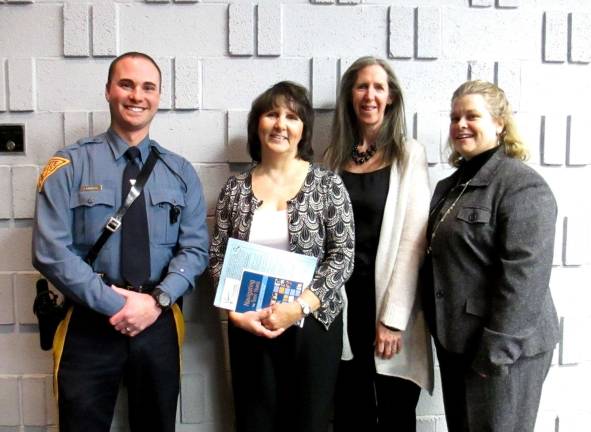High Point keeps parents involved

SUSSEX — Parents of High Point students recently had the opportunity to familiarize themselves with ways to recognize whether their children are abusing alcohol and other drugs.
“I have the most difficulty in the springtime with Prom season and celebration in getting people to understand the seriousness of having alcohol-related parties,” says Kate Romeo, the school’s Substance Abuse Coordinator. “I’d say alcohol is more prevalent among teens. The point is to educate parents and let them know that even kids from good homes with good grades can get involved with alcohol and other drugs.”
Becky Carlson is an assistant director at the Center for Prevention and Counseling.
“We’re trying to bring awareness,” she said. “Programs like these are great ways to provide parents with information that will help them understand and be able to recognize the signs, symptoms and trends for potential drug-use.”
The Center for Prevention and Counseling offers substance abuse warning signs for parents to look for in their children: sudden or gradual drop in grades and achievement levels, skipping classes, blood shot eyes, burns on hands or clothing, blackouts and isolation are just a few.
Most importantly, the Center urges parents if their child is using alcohol, tobacco or other drugs, address the situation immediately and get help.
Information provided by ‘Project Alert: Navigating the Teen Years’ opens the door for communication between parents and their children, says Carlson.
“The car, for example, is a great place for a parent to speak with their child about something serious," she said. "The focus isn’t on each other, there are no distractions and the child is forced to listen. Where else do they have to go while driving?
“Sometimes kids hear and see a lot of things, such as drug-users being vocal about their actions, and then they think everybody must be using,” Carlson said. “On top of that, you listen to the radio and television and there are jokes about smoking, drinking and drugs where getting high and drunk is made to look funny. It normalizes the seriousness of it. The truth is not everybody else is doing it.”
Trooper Jim Bambara has been working within the High Point district for five years.
“What we’re seeing for high school-aged kids is that they’re getting access to prescription medications and alcohol, things you can find at home,” he said. “As they start to get a little bit older — juniors and seniors — that’s when they start getting into marijuana, and then it’s almost as if once they graduate, heroin shows up.”
A Center statistic shows every day in the United States, 2,500 youth between the ages of 12 and 17 abuse a prescription pain reliever for the first time.
According to Bambara, one of the things that helps parents get involved if they suspect their child is using and abusing drugs is “staying on top of your kid by checking in every once in a while: know where they are going and who they are with.”
Carlson says parents need to take a stand.
“If a teen is not going to feel any consequences for their actions, why wouldn’t they use?" she said. "When a couple finds out their child is abusing alcohol and other drugs, both parents need to be on the same page, whether they’re married, divorced, etc. Without a united front, parents will get nowhere.”